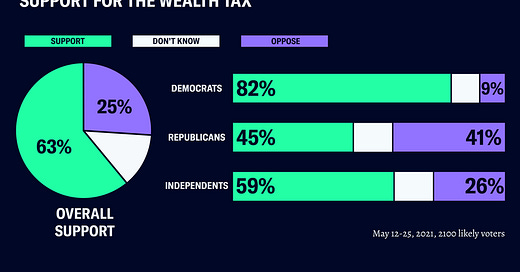Popular economic policy proposals are not enough to save the Democrats 📊 October 17, 2021
Voters care about too many things for "economic populism" alone to remake class politics and save the Democratic Party
I have spent my weekend combing through the copy edits for Strength In Numbers and only have time for a few brief remarks for today’s newsletter.
First, thanks to all who reached out about last week’s email on the future of the Democratic Party. Several of you had insightful comments that will form the basis of another post on this subject soon. Specifically, several of you emailed about the role that gender plays in political psychology in general and the education divide in voting in particular. There’s more to say here that the media does seem to be missing.
But second, and on related numbers, I want to follow-up on a subscribers-only post sent out yesterday about the popularity of the most redistributive and economically “populist” portions of Joe Biden’s “Build Back Better” agenda and the Democrats’ corresponding reconciliation bill in Congress. Polling from Navigator research suggests that about 80% of Americans think giving Medicare the power to negotiate prices for prescription drugs is a “good reason” to pass the BBB Act, and 75% think raising taxes on “the rich and corporations to make sure they pay their fair share” is also a good reason.
But if the popularity of economic populism is all that mattered in politics, I’d wager, the reconciliation bill would pass tomorrow and Democrats would win Congressional majorities for years. But that is not the political environment we live in. So when people allege that oh, if only Democrats would focus on these popular planks of their policy agenda they’d win more votes, they’re missing quite a few other forces that act on the average American voter’s psyche. An incomplete list of those factors might include…
The voting intention of groups we feel close to and people we trust
Preferences on “social” issues that may outweigh issues of taxation, economic programs safety nets
Various cultural attitudes, such as towards racial minorities and women, that are linked to voting
The narrow interests of highly politically active groups we may be part of, such as on housing or environmental/energy policy
The attitudes of people we get our news from — especially on the right, as Fox News has a measurable effect on both voters’ attitudes and media agendas, which creates a feedback loop that helps steer conversations towards issues that help the right (such as on crime and violent protests in 2020, and Critical Race Theory and schools in 2021)
Voters’ symbolic and abstract desires for small government and conservative policymaking
Sure, this is not a comprehensive list. But the purpose is to show that, if embracing wealth redistribution and massive social spending is all Democrats had to do to save themselves, Elizabeth Warren would be president today and Joe Manchin and Kyrsten Sinema wouldn’t be blocking her agenda in Congress.
But, one final point! Doing popular things doesn’t usually hurt a party. And in this case, the economic policies that voters like could end up helping a lot of people. That seems obvious but is always worth repeating. Politics is not just a game between factions, it is a fight to improve standards of living and representation in government.
Posts for subscribers
If you like this post, please share it — and consider a paid membership to read more in-depth posts from me. Subscribers received two extra exclusive posts over the last week, including:
What I wrote last week
Joe Biden’s job approval rating continues to hit new lows in The Economist’s tracker of polls conducted by YouGov, its partner pollster. Here’s a short article and chart positing a few factors that could be causing the decline. The biggest story in the data is that people don’t trust him (or Democrats more broadly) on how to handle the economy, and with inflation warning signs blaring and growth slowing, are becoming less likely to approve of his presidency on these grounds.
And here is another item from our “Checks and Balance” US politics newsletter going over the continued appearance of Americans as symbolic conservatives and operational liberals, which has persisted for roughly 50 years and won’t likely go away any time soon.
Thanks for reading
That’s it for this week. Thanks so much for reading. If you have any feedback, you can reach me at this address (or respond directly to this email if you’re reading in your inbox). I love to talk with readers and am very responsive to your messages.






